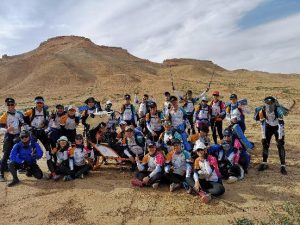Chen Tze-kin shares his journey with a rare disease on his YouTube channel to inspire others.
By Winnie Li
Suffering from a rare disease, Noddy Chen Tsz-kin cannot wear clothes by himself and even a smartphone is too heavy for the 15-year-old to hold.
The illness Chen has is Duchenne muscular dystrophy, which causes progressive muscle fibre degeneration and weakness.
“I need my mum’s help to wear my clothes,” says Chen, who was diagnosed with the sickness when he was only one year old.
“I have to leave home 20 minutes earlier so that I can arrive at school on time because the nearest MTR exit has no lift with it,” the Form Three student says.

Despite his disability, Chen leads a very busy life with his studies and YouTube channel.
His channel “Snail Tszkin”, launched in 2020 so far has 15.6 thousands followers.
“I name the channel snail because every move I make is slow like a snail,” he says.
Chen does all the script writing, shooting, and editing by himself, and it takes him about six to seven hours to prepare a five-minute-long video.
The secondary school student shares his daily life as a disabled person in his channel, hoping to encourage others who suffer from disabilities like him to lead a happy and fruitful life.
“I started thinking of being a YouTuber after joining an ultramarathon in Gobi Desert in 2018. I want to tell people that a lot of things are possible through my YouTube channel,” Chen says.

Chen went to the Gobi Desert and Kyrgyzstan to join ultramarathon competitions in 2018 and 2019 with Wheel for Oneness (WFO), which helps the disabled to join marathons.
Since the whole journey was video recorded, Chen started to get used to camera shooting.
“Me and my mum have never thought of going to the desert. I was very excited when I knew that I had the chance to join the trip,” Chen recalls adding that when he joined the competition he was nine.
During the competition, Chen recalls he and his teammates came across a dune as tall as the International Finance Centre (IFC) in Hong Kong, which is 412 metres tall, during the long march in the Gobi Desert.
“A team of 40 carried me with a rickshaw. It was a challenge to go up the dune, but we decided to do it rather than picking another route,” Chen recalls.
“We wanted to show our determination to overcome difficulties along the way in the desert. We did not want to give up easily. We should try to deal with them,” he says.

Apart from the ultramarathon, Chen joined an activity “Dreams2Gather” held by the Adolescent Medical Centre of Queen Elizabeth Hospital in 2013, which helps disabled children make their wishes come true.
“Although I’m affected by the disease, it doesn’t limit me from exploring the world,” Chen says.
Thanks to the help of the centre, Chen took a helicopter ride to see the scenery of Victoria Harbour. He met Steve Ma Chun Wai, a Hong Kong singer and shared his thoughts at human library Lingnan University with other disabled children who joined Dreams2Gather.
“Since my life is shorter than others, I don’t want to spend my time feeling sad. I want to explore the world. There are a lot of people leaving me supportive messages on my channel. They also have helped shape who I am now,” Chen says.
Chen also wants to help others despite his condition.
“Sometimes I do sharing sessions in school. I receive help from others, and I want to help others by spreading positive vibes in life. I don’t think doing nothing is a choice. We should explore our interests instead of giving up,” he says.
Chen also joined a course “Jin Ngo” in Chinese last year, which means “show me”. It is a speech course arranged by Hong Kong Rehabilitation Power, an NGO that helps the disabled to find jobs.
Chen is interested in doing speeches because he thinks that it is similar to running his YouTube channel and sharing about himself.
“I think it is more powerful to communicate with others face-to-face than sharing through videos, so I want to do more speeches in the future,” Chen says.
Edited by Jasmine Lam
Sub-edited by Nicole Li







































